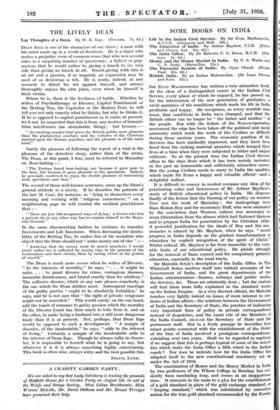THE LIVELY DEAN -
Lay Thoughts of a Dean. By W. R. Inge. (Putnam. 7s. 6d.) DEAN INCE is one of the characters of our times ; a man with his mind made up in a world of doubters. He is a bigot who makes a prejudice even of common sense (but who sees several sides to a surprising number of questions) ; a fighter so pug- nacious that he would rather be giving a knock to his own side than giving no knock at all. Knock-giving with him is an art and a passion, if so ungainly an expression may be used of so dexterous a wit. He is ready, indeed, at any moment to direct his wit against himself, and always thoroughly enjoys his own jokes, even when he himself is their victim.
Where he is, there is the liveliness of battle. Whether he writes of Psychotherapy or Divorce, Capital Punishment or the Betting Tax, the Capitalist or the Modern Poet, he will tell you not only exactly what he thinks, but why he thinks it. If he is opposed to capital punishment as it exists at present, let it not be suspected that this is from any motive of humani- trian interference (an abominable thing) ; but because :-
" An exciting murder trial gives the British public more pleasure than the gladiatorial combats and the tortures of the Christian martyrs gave the Roman populace, and the pleasure is of the same kind."
Surely the pleasure of following the report of a trial is the pleasure of the detective story, rather than of the arena. The Dean, at this point, I fear, must be referred to Macaulay on Bear-baiting :-
" The Puritan hated bear-baiting, not because it gave pain to the bear, but because it gave pleasure to the spectators. Indeed, be generally contrived to enjoy the double pleasure of tormenting both spectators and bear."
The second of those well-known sentences, sums up the Dean's general attitude to a nicety. If he describes the patients of the late M. Corte, for instance, as " lying to themselves every morning and evening with ' religious earnestness,' " on a neighbouring page he will remind the medical practitioner that :-
"Them are just 189 recognised ways of dying ; a doctor who lets a patient die in any other way has to explain himself to the Regis- trar-General."
In the same disconcerting fashion he ventures to consider Investments and Life Insurance. When discussing the desira- bility of the Betting Tax, he makes fun of the moralists who object that the State should not " make money out of vice " :—
" Assuming that the money must be raised somehow, I would much rather see it collected by taxing vice, in the persons of the bookmakers and their clients, than by taxing virtue in the person of myself."
The Dean is much more severe when he writes of Divorce. " In the interests of morality," he says, " . . . it might be safer, . . . to grant divorce for crime, contagious diseases, incurable drunkenness, and brutal cruelty than for adultery." The collusive divorce, which at any rate pleases somebody, is the one which the Dean dislikes most. Subsequent marriage of the guilty parties " ought to be absolutely forbidden," he says, and he is not sure that " the right of private vengeance might not be conceded." This would surely, on the one hand, add the touch of romance to guilty passion which the morality of the Divorce Court has done much to take from it, and on the other, to make being a husband into a still more dangerous trade than it is at present. Not, perhaps, that Dean Inge would be opposed to such a development. " A margin of disorder, of the incalculable," he says, " adds to the interest of living." Certainly a margin of the incalculable adds to the interest of Dean Inge. Though he always talks in charac- ter, 'it is impossible to foretell what he is going to say, but whatever it is it is always something highly entertaining. This book is oftenwise, always witty and the best possible fun..
SYLVIA LYND.


































 Previous page
Previous page